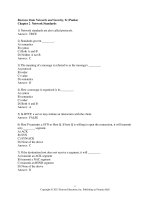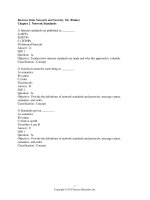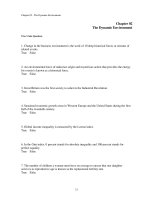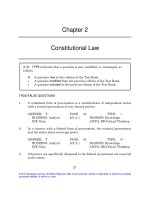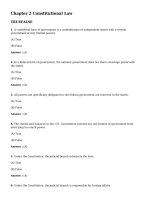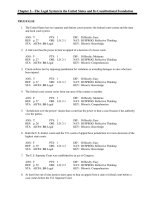Business law texts and cases 13th edition clarkson test bank
Bạn đang xem bản rút gọn của tài liệu. Xem và tải ngay bản đầy đủ của tài liệu tại đây (152.35 KB, 11 trang )
Chapter 2
Courts and Alternative
Dispute Resolution
N.B.: TYPE indicates that a question is new, modified, or unchanged, as follows.
N
+
=
A question new to this edition of the Test Bank.
A question modified from the previous edition of the Test Bank.
A question included in the previous edition of the Test Bank.
TRUE/FALSE QUESTIONS
B1.
Laws would be meaningless without the courts to interpret and apply them.
ANSWER: T
BUSPROG: Analytic
B2.
+
PAGE:
28
TYPE:
AICPA: BB-Legal
N
Because corporations are not considered legal persons, courts use different
principles to determine whether it is fair to exercise jurisdiction over a
corporation.
ANSWER: F
BUSPROG: Analytic
B4.
28
TYPE:
AICPA: BB-Legal
The federal courts are superior to the state courts.
ANSWER: F
BUSPROG: Analytic
B3.
PAGE:
PAGE:
29
TYPE:
AICPA: BB-Legal
N
Under the authority of a long arm statute, a court can exercise personal
jurisdiction over certain out-of-state defendants.
1
© 2015 Cengage Learning. All Rights Reserved. May not be scanned, copied or duplicated, or posted to a publicly
accessible website, in whole or in part.
2
TEST BANK B—UNIT ONE: THE LEGAL ENVIRONMENT OF BUSINESS
ANSWER: T
BUSPROG: Analytic
B5.
29
TYPE:
AICPA: BB-Legal
+
PAGE:
30
TYPE:
N
AICPA: BB-Critical Thinking
PAGE:
31
TYPE:
AICPA: BB-Legal
N
To have standing to sue, a party must have complaining sufficient stake in a
matter to justify seeking relief through the court system.
ANSWER: T
BUSPROG: Analytic
B9.
PAGE:
For purposes of diversity of citizenship, a corporation is a citizen only of the
state in which its principal place of business is located.
ANSWER: F
BUSPROG: Analytic
B8.
+
The minimum-contacts requirement is usually met if a corporation advertises or
sells its products within a state.
ANSWER: T
BUSPROG: Reflective
B6.
29
TYPE:
AICPA: BB-Legal
A court can exercise jurisdiction over property that is located within its
boundaries.
ANSWER: T
BUSPROG: Analytic
B7.
PAGE:
PAGE:
36
TYPE:
AICPA: BB-Legal
+
Small claims courts are inferior trial courts.
ANSWER: T
BUSPROG: Analytic
PAGE:
39
TYPE:
AICPA: BB-Legal
=
B10. Courts of appeals conduct new trials in which evidence is submitted to the
court and witnesses are examined.
ANSWER: F
BUSPROG: Reflective
PAGE:
39
TYPE:
=
AICPA: BB-Critical Thinking
B11. U.S. district courts have concurrent jurisdiction with state courts in matters
involving federal questions.
© 2015 Cengage Learning. All Rights Reserved. May not be scanned, copied or duplicated, or posted to a publicly
accessible website, in whole or in part.
CHAPTER 2: COURTS AND ALTERNATIVE DISPUTE RESOLUTION
ANSWER: F
BUSPROG: Reflective
PAGE:
3
40
TYPE:
+
AICPA: BB-Critical Thinking
B12. The United States Supreme Court can review any case decided by any of the
federal courts of appeals.
ANSWER: T
BUSPROG: Analytic
PAGE:
41
TYPE:
AICPA: BB-Legal
=
B13. Litigation is the process of resolving a dispute through the court system.
ANSWER: T
BUSPROG: Reflective
PAGE:
41
TYPE:
AICPA: BB-Risk Analysis
N
B14. In mediation, the mediator proposes a solution and makes a decision resolving
the dispute.
ANSWER: F
BUSPROG: Reflective
PAGE:
42
TYPE:
+
AICPA: BB-Critical Thinking
B16. A court’s review of an arbitrator’s award may be restricted.
ANSWER: T
BUSPROG: Analytic
PAGE:
43
TYPE:
AICPA: BB-Legal
=
B17. Mandatory arbitration clauses in employment contracts are generally
enforceable.
ANSWER: T
BUSPROG: Analytic
PAGE:
45
TYPE:
AICPA: BB-Legal
=
B18. A mini-trial is a private proceeding in which each party’s attorney argues the
party’s case before the other party.
ANSWER: T
BUSPROG: Reflective
PAGE:
45
TYPE:
=
AICPA: BB-Critical Thinking
B19. The verdict in a summary jury trial is not binding.
ANSWER:
T
PAGE:
45
TYPE:
+
© 2015 Cengage Learning. All Rights Reserved. May not be scanned, copied or duplicated, or posted to a publicly
accessible website, in whole or in part.
4
TEST BANK B—UNIT ONE: THE LEGAL ENVIRONMENT OF BUSINESS
BUSPROG: Analytic
AICPA: BB-Legal
B20. International treaties never stipulate arbitration for resolving disputes.
ANSWER: F
BUSPROG: Reflective
PAGE:
46
TYPE:
N
AICPA: BB-Critical Thinking
B15. The United States will not enforce a foreign court’s decision.
ANSWER: F
BUSPROG: Reflective
PAGE:
46
TYPE:
N
AICPA: BB-Critical Thinking
MULTIPLE-CHOICE QUESTIONS
B1.
As a judge in a federal court, Christine can decide, among other things,
whether the laws or actions of the executive and legislative branches are
constitutional. The process for making this determination is known as
a.
b.
c.
d.
judicial review.
jurisdiction.
venue.
early neutral case evaluation.
ANSWER: A
BUSPROG: Reflective
B2.
28
TYPE:
AICPA: BB-Legal
N
Lewis wants to file a suit against Mikayla. Before any court can hear the case
a.
b.
c.
d.
the parties to the dispute must agree.
the court must have jurisdiction.
the court must issue a deposition.
the parties must own property.
ANSWER: B
BUSPROG: Reflective
B6.
PAGE:
PAGE:
29
TYPE:
AICPA: BB-Legal
N
A Maryland state court can exercise jurisdiction over National Insurance
Corporation, an out-of-state company, if the firm has
a.
minimum contacts with the state.
© 2015 Cengage Learning. All Rights Reserved. May not be scanned, copied or duplicated, or posted to a publicly
accessible website, in whole or in part.
CHAPTER 2: COURTS AND ALTERNATIVE DISPUTE RESOLUTION
b.
c.
d.
maximum contacts with the state.
medium contacts with the state.
no contacts with the state.
ANSWER: A
BUSPROG: Reflective
B3.
29
TYPE:
N
AICPA: BB-Decision Modeling
federal and state courts have concurrent jurisdiction.
federal courts have exclusive jurisdiction.
no court has jurisdiction.
state courts have exclusive jurisdiction.
ANSWER: A
BUSPROG: Reflective
PAGE:
31
TYPE:
AICPA: BB-Legal
N
Marcus files a suit against Naomi in an Ohio state court. Naomi’s only connection to Ohio is an ad on the Web originating in Pennsylvania. For Ohio to
exercise jurisdiction, the issue is whether Naomi, through her ad, has
a.
b.
c.
d.
a commercial cyber presence in Ohio.
conducted substantial business with Ohio residents.
claimed to be a resident of Ohio.
solicited virtual business in Ohio.
ANSWER: B
BUSPROG: Reflective
B5.
PAGE:
Fresh Harvest Company, which is based on Georgia, packages and sells
vegetables. Hayden, who is a resident of Indiana, buys a Fresh Harvest product,
eats it, and suffers severe food poisoning. Hayden wants to file a suit against
Fresh Harvest. The diversity of citizenship between these parties means that
a.
b.
c.
d.
B4.
5
PAGE:
33
TYPE:
AICPA: BB-Legal
+
Delia files a suit against Eduardo in a Florida state court over the ownership of
a boat docked in a Florida harbor. Both Delia and Eduardo are residents of
Georgia. Eduardo could ask for a change of venue on the ground that Georgia
a.
b.
c.
d.
has a sufficient stake in the matter.
has jurisdiction.
has sufficient minimum contacts with the parties.
is a more convenient location to hold the trial.
© 2015 Cengage Learning. All Rights Reserved. May not be scanned, copied or duplicated, or posted to a publicly
accessible website, in whole or in part.
6
TEST BANK B—UNIT ONE: THE LEGAL ENVIRONMENT OF BUSINESS
ANSWER: D
BUSPROG: Reflective
B7.
=
a U.S. district court.
the Colorado Supreme Court.
the United States Supreme Court.
the U.S. Court of Appeals for the Ninth Circuit.
ANSWER: B
BUSPROG: Reflective
PAGE:
39
TYPE:
=
AICPA: BB-Critical Thinking
The Montana Supreme Court rules against Natural Grocery Mart in a case
against One Stop 2 Shop Stores, Inc. Natural Grocery files an appeal with the
United States Supreme Court. The Court does not hear the case. This
a.
b.
c.
d.
is a decision on the merits that has value as a precedent.
indicates agreement with the Montana court’s decision.
means nothing.
means that the Montana court’s decision is the law in Montana.
ANSWER: D
BUSPROG: Reflective
B9.
36
TYPE:
AICPA: BB-Legal
Arnold loses his suit against Buffy in a Colorado state trial court. Arnold appeals to a state intermediate court of appeals and loses again. Arnold would
appeal next to
a.
b.
c.
d.
B8.
PAGE:
PAGE:
41
TYPE:
AICPA: BB-Legal
=
The Iowa Supreme Court rules against Jennifer in a case against Kut-Rate
Stores, Inc. Jennifer wants to appeal her case to the United States Supreme
Court. She must ask the Court to issue a writ of
a.
b.
c.
d.
appeal.
certiorari.
jurisdiction.
summons.
ANSWER: B
BUSPROG: Reflective
PAGE:
41
TYPE:
N
AICPA: BB-Critical Thinking
B10. Lorena files a suit against Milton. Before going to trial, the parties, with their
attorneys, meet to try to resolve their dispute. A third party suggests or
© 2015 Cengage Learning. All Rights Reserved. May not be scanned, copied or duplicated, or posted to a publicly
accessible website, in whole or in part.
CHAPTER 2: COURTS AND ALTERNATIVE DISPUTE RESOLUTION
7
proposes a resolution, which the parties may or may not decide to adopt. This
is
a.
b.
c.
d.
arbitration.
mediation.
negotiation.
not a legitimate form of dispute resolution.
ANSWER: B
BUSPROG: Reflective
PAGE:
42
TYPE:
=
AICPA: BB-Critical Thinking
B11. Orson files a suit against Portia. Before going to trial, the parties meet, with
their attorneys to represent them, to present their dispute to a third party who is
not a judge but who imposes a resolution on the parties. This is
a.
b.
c.
d.
arbitration.
mediation.
negotiation.
not a legitimate form of dispute resolution.
ANSWER: A
BUSPROG: Reflective
PAGE:
42
TYPE:
=
AICPA: BB-Critical Thinking
B16. The least expensive method of resolving a dispute between Ronald and Sharon
may be
a.
b.
c.
d.
arbitration because the case will be heard by a mini-jury.
litigation because each party will pay its own legal fees.
mediation because the dispute will be resolved by a non-expert.
negotiation because no third parties are needed.
ANSWER: D
BUSPROG: Reflective
PAGE:
42
TYPE:
N
AICPA: BB-Critical Thinking
B20. Bean House Coffees and Java Distributors, Inc., have a long-standing business
relationship that they would like to continue. For this reason, they may prefer to
settle any dispute between them through mediation because
a.
b.
c.
the case will be heard by a mini-jury.
the dispute will eventually go to trial.
the process is not adversarial.
© 2015 Cengage Learning. All Rights Reserved. May not be scanned, copied or duplicated, or posted to a publicly
accessible website, in whole or in part.
8
TEST BANK B—UNIT ONE: THE LEGAL ENVIRONMENT OF BUSINESS
d.
the resolution of the dispute will be decided an expert.
ANSWER: C
BUSPROG: Reflective
PAGE:
42
TYPE:
N
AICPA: BB-Critical Thinking
B12. HoneyBee Foods, Inc., in Illinois, and Jelly Roll Pastries, in Kentucky consent
to have their dispute resolved in arbitration according to the law of Illinois. This
is a ground for a court to
a.
b.
c.
d.
compel arbitration.
review the merits of the dispute.
review the sufficiency of the evidence.
set aside any award.
ANSWER: A
BUSPROG: Reflective
PAGE:
43
TYPE:
AICPA: BB-Legal
+
B13. Service Employees International Union and Timberline Products, Inc., have
their dispute resolved in arbitration. The arbitrator arbitrates issues that the
parties did not agree to submit to arbitration. This is a ground for a court to
a.
b.
c.
d.
none of the choices.
review the merits of the dispute.
review the sufficiency of the evidence.
set aside the award.
ANSWER: D
BUSPROG: Reflective
PAGE:
43
TYPE:
AICPA: BB-Legal
N
B14. First Community Credit Union and General Hydraulics. Inc., have their dispute
resolved in arbitration. Before determining the award, the arbitrator meets with
First Community’s representative to discuss the dispute without General
Hydraulics’ representative being present. If this meeting substantially
prejudices General Hydraulics’ rights, a court will most likely
a.
b.
c.
d.
compel arbitration.
review the merits of the dispute.
review the sufficiency of the evidence.
set aside any award.
ANSWER:
D
PAGE:
43
TYPE:
+
© 2015 Cengage Learning. All Rights Reserved. May not be scanned, copied or duplicated, or posted to a publicly
accessible website, in whole or in part.
CHAPTER 2: COURTS AND ALTERNATIVE DISPUTE RESOLUTION
BUSPROG: Reflective
9
AICPA: BB-Legal
B15. Transnational Corporation and United Shipping, Inc., agree to a contract that
includes an arbitration clause. If a dispute arises, a court having jurisdiction may
a.
b.
c.
d.
monitor any arbitration until it concludes.
order an arbitrator to rule in a particular way.
order a party to bring the dispute to court.
order a party to submit to arbitration.
ANSWER: D
BUSPROG: Reflective
PAGE:
44
TYPE:
AICPA: BB-Legal
N
B17. Lucille files a suit against Murray. They meet, and each party’s attorney argues
the party’s case before a judge and jury. The jury presents an advisory verdict,
after which the judge meets with the parties to encourage them to settle their
dispute. This is
a.
b.
c.
d.
a mini-trial.
a summary jury trial.
early neutral case evaluation.
not a legitimate form of dispute resolution.
ANSWER: B
BUSPROG: Reflective
PAGE:
45
TYPE:
AICPA: BB-Legal
=
B18. To resolve a dispute in nonbinding arbitration, Alyson in Baltimore and Chuck
in Denver utilize E-Resolve, an online dispute resolution (ODR) service. This
limits these parties’ recourse to the courts
a.
b.
c.
d.
not at all.
until the ODR service has issued a decision.
with respect to any dispute arising between them.
with respect to this dispute only.
ANSWER: A
BUSPROG: Reflective
PAGE:
46
TYPE:
AICPA: BB-Legal
=
B19. Transcontinental Tours, a U.S. firm, and Victoria Hotels, Ltd., a Canadian firm,
enter into a contract that does not have a forum-selection or choice-of-law
© 2015 Cengage Learning. All Rights Reserved. May not be scanned, copied or duplicated, or posted to a publicly
accessible website, in whole or in part.
10
TEST BANK B—UNIT ONE: THE LEGAL ENVIRONMENT OF BUSINESS
clause. Litigation between Transcontinental and Victoria over a dispute
involving this contract may occur in
a.
b.
c.
d.
Canada only.
Canada or the United States, but not both.
Canada, the United States, or both.
the United States only.
ANSWER: C
BUSPROG: Reflective
PAGE:
46
TYPE:
AICPA: BB-Legal
=
ESSAY QUESTIONS
B1.
BizApps hosts a Web site that advertises its software products, features
upgrades and patches for its existing products, and accepts orders from
customers throughout the world. Cassie, who owns and operates Holiday
Vacations, Inc., a travel agency in Wyoming, orders from the Web site a copy
of BizApps’s Price Control software. Price Control is designed to help
businesses obtain the best prices for their products and services. When Price
Control is found to have a defect in its calculating program, BizApps offers a
patch on its Web site to fix the problem. Cassie has already lost profits
because of the miscalculating defect, however, and files a suit against BizApps
in a Wyoming state court. Can the court exercise jurisdiction over BizApps?
Why or why not?
ANSWER: Some courts have upheld exercises of jurisdiction on the basis of
the accessibility of a Web page. Other courts have concluded that without
more, a presence on the Web is not enough to support jurisdiction over a
nonresident. Courts generally use a “sliding scale” standard for evaluating the
exercise of jurisdiction based on contacts over the Internet. On that scale, a
court’s exercise of personal jurisdiction depends on the amount of business
that an individual or firm transacts over the Internet. A Web site that accepts
orders from customers and provides upgrades and “patches” has a high degree
of interactivity. There may be a question as to the amount of business that
BizApps transacts with residents of Wyoming. If that business is substantial,
BizApps would likely be subject to the court’s jurisdiction.
PAGES:
33–34
BUSPROG: Reflective
TYPE:
=
AICPA: BB-Decision Modeling
© 2015 Cengage Learning. All Rights Reserved. May not be scanned, copied or duplicated, or posted to a publicly
accessible website, in whole or in part.
CHAPTER 2: COURTS AND ALTERNATIVE DISPUTE RESOLUTION
B2.
11
Able Trucking Corporation files a suit in a state court against Bob’s Service
Company (BSC), and wins. BSC appeals the court’s decision, asserting that
the evidence presented at trial to support Able Trucking’s claim was so scanty
that no reasonable jury could have found for the plaintiff. Therefore, argues
BSC, the appellate court should reverse the trial court’s decision. Is the
appellate court likely to reverse the trial court’s findings with respect to the
facts? Explain.
ANSWER: An appellate court will reverse a lower court’s decision on the
basis of the facts only when the finding is clearly erroneous (that is, when it is
contrary to the evidence presented at trial) or when there is no evidence to
support the finding. Appellate courts normally defer to a trial court’s decision
with regard to the facts of a case, however, for several reasons. First, trial court
judges and juries have the opportunity to observe witnesses and tangible
evidence first hand. The appellate court sees only a cold record of the trial
court proceedings and therefore cannot make the kind of judgments about the
credibility of witnesses and the persuasiveness of evidence that can be
gleaned only from firsthand experience. Second, as occurs when there is no
jury and the case is heard by a judge, trial judges routinely sit as fact finders.
As a result, they develop a particular expertise in determining what kind of
evidence and testimony is reliable and what kind is not.
PAGE:
39
BUSPROG: Reflective
TYPE:
=
AICPA: BB-Critical Thinking
© 2015 Cengage Learning. All Rights Reserved. May not be scanned, copied or duplicated, or posted to a publicly
accessible website, in whole or in part.
